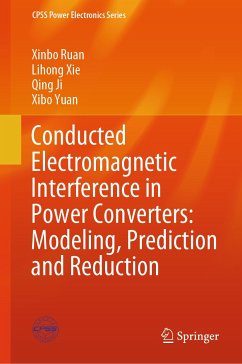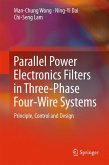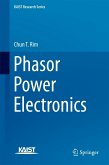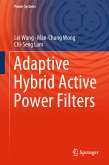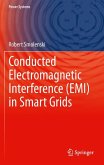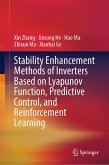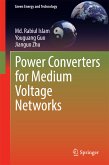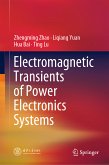Conducted Electromagnetic Interference in Power Converters: Modeling, Prediction and Reduction (eBook, PDF)


Alle Infos zum eBook verschenken

Conducted Electromagnetic Interference in Power Converters: Modeling, Prediction and Reduction (eBook, PDF)
- Format: PDF
- Merkliste
- Auf die Merkliste
- Bewerten Bewerten
- Teilen
- Produkt teilen
- Produkterinnerung
- Produkterinnerung

Hier können Sie sich einloggen

Bitte loggen Sie sich zunächst in Ihr Kundenkonto ein oder registrieren Sie sich bei bücher.de, um das eBook-Abo tolino select nutzen zu können.
This book belongs to the subject of electrical engineering. It focuses on the modeling, prediction and reduction of conducted EMI in power converters including the AC-DC rectifiers, DC-DC converters and DC-AC inverters and provides the analytical models and solutions to conducted EMI issues in practical applications. The theoretical analysis, simulation and experimental results are well presented with figures and tables. This book is an essential and valuable reference for the graduate students and academics majoring in power electronics and the engineers being engaged in solving the conducted…mehr
- Geräte: PC
- ohne Kopierschutz
- eBook Hilfe
- Größe: 20.75MB
![Parallel Power Electronics Filters in Three-Phase Four-Wire Systems (eBook, PDF) Parallel Power Electronics Filters in Three-Phase Four-Wire Systems (eBook, PDF)]() Man-Chung WongParallel Power Electronics Filters in Three-Phase Four-Wire Systems (eBook, PDF)40,95 €
Man-Chung WongParallel Power Electronics Filters in Three-Phase Four-Wire Systems (eBook, PDF)40,95 €![Phasor Power Electronics (eBook, PDF) Phasor Power Electronics (eBook, PDF)]() Chun T. RimPhasor Power Electronics (eBook, PDF)113,95 €
Chun T. RimPhasor Power Electronics (eBook, PDF)113,95 €![Adaptive Hybrid Active Power Filters (eBook, PDF) Adaptive Hybrid Active Power Filters (eBook, PDF)]() Lei WangAdaptive Hybrid Active Power Filters (eBook, PDF)105,95 €
Lei WangAdaptive Hybrid Active Power Filters (eBook, PDF)105,95 €![Conducted Electromagnetic Interference (EMI) in Smart Grids (eBook, PDF) Conducted Electromagnetic Interference (EMI) in Smart Grids (eBook, PDF)]() Robert SmolenskiConducted Electromagnetic Interference (EMI) in Smart Grids (eBook, PDF)73,95 €
Robert SmolenskiConducted Electromagnetic Interference (EMI) in Smart Grids (eBook, PDF)73,95 €![Stability Enhancement Methods of Inverters Based on Lyapunov Function, Predictive Control, and Reinforcement Learning (eBook, PDF) Stability Enhancement Methods of Inverters Based on Lyapunov Function, Predictive Control, and Reinforcement Learning (eBook, PDF)]() Xin ZhangStability Enhancement Methods of Inverters Based on Lyapunov Function, Predictive Control, and Reinforcement Learning (eBook, PDF)97,95 €
Xin ZhangStability Enhancement Methods of Inverters Based on Lyapunov Function, Predictive Control, and Reinforcement Learning (eBook, PDF)97,95 €![Power Converters for Medium Voltage Networks (eBook, PDF) Power Converters for Medium Voltage Networks (eBook, PDF)]() Md. Rabiul IslamPower Converters for Medium Voltage Networks (eBook, PDF)73,95 €
Md. Rabiul IslamPower Converters for Medium Voltage Networks (eBook, PDF)73,95 €![Electromagnetic Transients of Power Electronics Systems (eBook, PDF) Electromagnetic Transients of Power Electronics Systems (eBook, PDF)]() Zhengming ZhaoElectromagnetic Transients of Power Electronics Systems (eBook, PDF)121,95 €
Zhengming ZhaoElectromagnetic Transients of Power Electronics Systems (eBook, PDF)121,95 €-
-
-
Dieser Download kann aus rechtlichen Gründen nur mit Rechnungsadresse in A, B, BG, CY, CZ, D, DK, EW, E, FIN, F, GR, HR, H, IRL, I, LT, L, LR, M, NL, PL, P, R, S, SLO, SK ausgeliefert werden.
- Produktdetails
- Verlag: Springer Nature Singapore
- Seitenzahl: 213
- Erscheinungstermin: 12. Januar 2024
- Englisch
- ISBN-13: 9789819992959
- Artikelnr.: 69783432
- Verlag: Springer Nature Singapore
- Seitenzahl: 213
- Erscheinungstermin: 12. Januar 2024
- Englisch
- ISBN-13: 9789819992959
- Artikelnr.: 69783432
- Herstellerkennzeichnung Die Herstellerinformationen sind derzeit nicht verfügbar.
